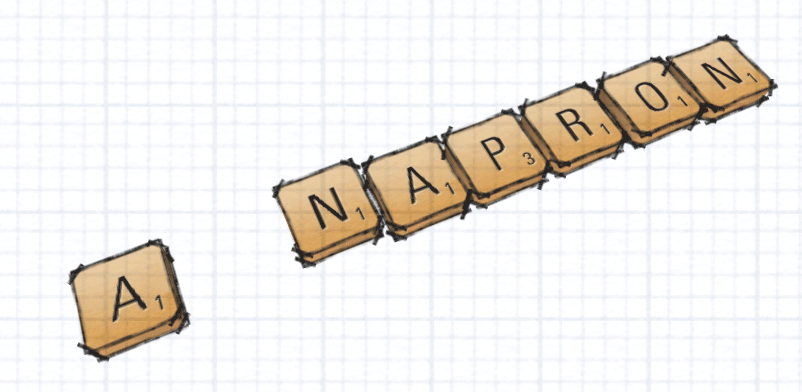Eggcorns and mondegreens: a feast of misunderstandings
Have you ever felt that you needed to nip something in the butt, or had the misfortune to witness a damp squid? And what can Jimi Hendrix, Bon Jovi and Freddie Mercury tell us about language change?
Well, if you know Hendrix’s classic “Purple Haze”, you surely remember the moment where he interrupts his train of thought with the unexpected request, ‘Scuse me while I kiss this guy. Or perhaps you recall “Living on a Prayer”, where we hear that apparently It doesn’t make a difference if we’re naked or not. And who can forget the revelation, in “Bohemian Rhapsody”, that Beelzebub has a devil for a sideboard?

If you do remember these lyrics fondly, you are not alone – lots of people are familiar with these exact lines. There is just one problem, of course: none of those songs really say those things. Instead, the lyrics involved are ‘Scuse me while I kiss the sky; It doesn’t make a difference if we make it or not; and Beelzebub has a devil put aside for me. And yet thousands of English speakers the world over have had the experience of listening to “Purple Haze” and the others – and of misunderstanding the words, entirely independently, in exactly the same way.
Mishearings of this kind are common enough that they have been given a name of their own, mondegreens – a word invented by the American writer Sylvia Wright, who as a child heard a poem containing the following lines:
For they hae slain the Earl o’ Moray
And laid him on the green
and assumed that it listed not one but two victims – the unfortunate Earl himself, and “Lady Mondegreen”, a plausible character who happens not to feature in the real poem.
Why does this kind of thing happen? One reason has to do with the nature of spoken language. On the page, English sentences come pre-packaged into words, each of which is made up of distinct, easily-identified letters which look pretty much the same every time. But pronounced out loud, they are not like that! Instead, a continuous, mushy stream of noise makes its way into our ears, and it is up to our brains to work out what speech sounds are actually in there, where one word ends and the next one begins (think the-sky versus this-guy), and so on. Obviously this process is not exactly helped when there are rock guitars competing for your attention too.

But another reason is that we are never ‘just listening’ passively. Instead, behind the scenes, our minds are busy trying to relate what we’re hearing to our existing knowledge – not only our linguistic knowledge, but our general knowledge about the world. For example, the common-sense knowledge that people tend to kiss other people, rather than intangible abstractions like the sky. This is obviously very useful most of the time, but in the “Purple Haze” case it leads us astray, because the more implausible meaning is the one that Jimi Hendrix intended.
What has this all got to do with language change? Well, the crucial point is that what I’ve just said – interpreting sounds is complicated, and to navigate the process we engage our common sense as well as our knowledge of the language – applies just as well to normal conversation as it does to song lyrics. We don’t always hear things perfectly, and even if we do, we have to square the things we’ve just heard with the things we already knew, which provide a guide for our interpretation but may sometimes take us in the wrong direction.
So if you hear someone referring to a really disappointing experience as a damp squib, but are not familiar with squib (an old-fashioned word for a firework), what is to stop you thinking that what you really heard was damp squid? A squid is, after all, a very damp creature, and not always something that people are hugely fond of. Similarly, the expression to nip in the bud makes sense if you latch on to the gardening metaphor it is based on – but if you don’t, well, nipping an undesirable thing in the butt does sound like a very effective way of getting rid of it. So, people who think the expressions really are damp squid and nip in the butt have made a mistake along the lines of “kiss this guy”; the difference is that here they may end up using the new versions in their own speech, and thus pass them on to other speakers. And the process doesn’t have to involve whole expressions: individual words are susceptible to it too, for example midriff becoming mid-rift or utmost becoming up-most.

Misinterpreted words and expressions like these, which have some kind of new internal logic of their own, are known as eggcorns. This is because egg-corn is exactly how some English speakers have reinterpreted the word acorn, on the basis that acorns are indeed egg-shaped seeds. And the development of a new eggcorn may not involve any mishearing at all, just reinterpretation of one word as another one that sounds exactly the same. Are you expected to toe the line or to tow the line? Are people given free rein or free reign? In each case the two expressions sound identical, and each brings with it some kind of coherent mental image. For the moment, toe the line and free rein are still considered to be the ‘correct’ versions of these idioms, but perhaps in the future that will no longer be the case.
As words and expressions are reinterpreted over time, the language changes little by little: in speech and in writing, people pass on their reinterpretations to one another, in a way which may eventually pass right through the language. The underlying factors producing eggcorns are the same as those producing mondegreens. But unlike the lyrics of “Purple Haze”, words and idioms don’t generally have a fixed author and don’t belong to anybody, meaning that if everyone started calling acorns eggcorns, then that just would be the correct word for them: the previous, now meaningless term acorn would be no more than a historical curiosity, and English as a whole would be very slightly different from how it is now.
So this is how we get from Jimi Hendrix to language change – via mondegreens and eggcorns. Have you spotted any eggcorns in the wild? And how likely do you think they are to catch on and become the new normal?



